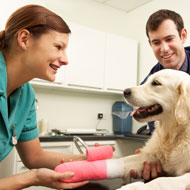White paper shines light on vocational routes to vet nursing

Apprenticeship programmes are now a popular option
The Department for Education (DfE) recently announced, as part of its Skills for Jobs White Paper, that it wanted to “put an end to the illusion that a degree is the only route to success and a good job and that further and technical education is the second-class option”.
As the white paper looks to align education with the needs of local employers, programmes such as employer-led apprenticeships and training are set to receive more government support. This can be good news for the many veterinary practices committed to vocational training.
Karen Lee, Head of Learning at Central College of Animal Studies (CCOAS) said: “Our apprenticeship programme for student veterinary nurses is now a popular option. Students are employed in one of our approved training practices alongside attending college.”
Shortages of registered veterinary nurses has been an issue for the veterinary industry in recent years and there may be several knock-on effects from the Covid-19 pandemic that will cause further delays in providing qualified staff in the workplace. It appears that the government has removed several of the previous hurdles and access to vocational training is now more accessible; as well as being highly valued by employers.
Karen agrees that this a positive step and encourages anyone interested in veterinary nursing to get in contact. “Veterinary nursing continues to be a highly sought-after, rewarding career choice and we are delighted to offer more than just one route to qualification.”
More information on the Skills for Jobs white paper can be found here. The Central College of Animal Studies can be contacted by calling 01359 243405 or emailing enquiries@ccoas.org.uk



 The Greyhound Board of Great Britain has published new vaccination guidance, with all greyhounds registered from 1 January, 2027 required to have the L4 leptospirosis vaccination, rather than L2.
The Greyhound Board of Great Britain has published new vaccination guidance, with all greyhounds registered from 1 January, 2027 required to have the L4 leptospirosis vaccination, rather than L2.